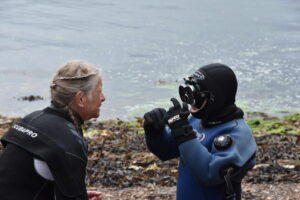Stromness Museum Snorkel Safaris
Stromness Museum have been running Snorkel safaris out of their local harbour in Orkney with the aim of encouraging more visitors to discover the fantastic natural history on the museum’s doorstep. Katy Firth, the museum’s Climate Change Exhibitions and Outreach Officer, explains how crucial local partnerships have been in helping to embed this project into the local area, as well as providing a greater understanding of the museum’s collections to a much wider audience.

The project
One of the features which makes Stromness Museum special is its location directly on the seafront, with its own pier and small section of shoreline below. We are originally Orkney Natural History Society Museum and care for many amazing collections of natural history specimens including seaweeds, shells, birds, and pressed plants.
As divers flocked to Orkney for the centenary of the scuttling of the German WW1 Navy in 2019, we wanted to encourage people to delve into the natural history of the wrecks and of Scapa Flow – one of the world’s largest natural harbours. So, we applied for an MGS Festivals Fund grant to host a snorkel safari at the museum pier with local dive school Scapa Scuba. This tied in with our summer exhibition ‘Living Wrecks: The Marine Life of Scapa Flow’.
Fast-forward four years and we have navigated a pandemic and pivoted the work of the museum to respond to climate and nature emergencies. Possibly more than ever before, our historic natural history collection has gained relevance in its ability to connect people with Stromness, Orkney, and our planet.
We have now successfully co-run four snorkel safaris, the latest three being with dive school Kraken Diving. Our safari in August took place in a seagrass bed and gave us the opportunity to highlight work taking place in Orkney by Project Seagrass. This global charity is collecting seeds from Orkney to re-populate depleted seagrass beds in the river Forth. Recording marine wildlife has now become a focus of the safaris.
Successes
- The safaris give new audiences a unique experience with the museum and its natural history collections. Before each snorkel safari at the museum, participants have a behind-the-scenes look at our seaweed collections, to see specimens collected locally over 100 years ago.
- Partnerships: As well as our partnership with the local dive schools, in 2022 we teamed up with Seasearch – a national citizen science project to encourage volunteer recording of the UK’s marine life. Seasearch have a local coordinator based in Stromness who came along to our safaris and added value to the events by asking snorkelers which species they had seen underwater. Not only did this encourage people to contribute to a national recording scheme, but it also developed their personal knowledge and awareness of biodiversity on their doorstep.
- Repeat participants – several people have come on multiple safaris as they have enjoyed it so much.
- New volunteers – five local snorkelers assisted with the safaris to help point out and identify marine wildlife.
- Income for the museum – the first safari was funded by the MGS Festivals Fund. However, in 2022 we trialed a paid safari and they have all sold out since. Although modest, this does make some income for the museum – £5 per booking.
“I love sharing my passion for Orkney’s marine wildlife with our snorkel safari participants. It’s great to be able to open folk’s eyes to what lives underwater, just on our doorstep. Hopefully this will encourage people in our community and beyond to become advocates for the marine environment of Orkney.”
Katy Firth, Climate Change Exhibitions and Outreach Officer, Stromness Museum
Challenges
- Given the staff-time investment of organising, promoting, and delivering the safaris, they are unlikely to be financially profitable.
- Given the nature of the activity, it was essential to find a fully insured and experienced dive school to lead the events. This is expensive, but we discovered that this was an experience that participants were willing to pay for.
Impact
- Wellbeing has been an unexpected outcome of the safaris. One participant was particularly nervous beforehand. She provided the following feedback: “Great experience, fab event. Great support from everyone, even when I thought I couldn’t do it. Thank you so much. I can’t wait to do it again.”
- Participants have added to marine biodiversity records – helping to inform policymakers such as Marine Scotland.
- Helped to highlight and safeguard our local natural resources.
- Building resilience through connecting locally.
- Inspired local artist to produce work for the museum which we now sell as a t-shirt design. This inspired another local artist to produce a beautiful piece of writing about her experience.
- Helped to raise the museum’s profile as an environmentally focused organisation as well as one that is committed to serving and engaging its community on local matters.
Guidance
- Look outward into your community for help – from passionate volunteers to local businesses which provide unique services and charities such as Marine Conservation Society. Working with these organisations out with our sector has made us relevant and helped us reach more people. We could not have offered these experiences to participants without their involvement.
- Be creative in imagining what fun and unique experiences your collection can inspire. Draw on staff passions and experience.